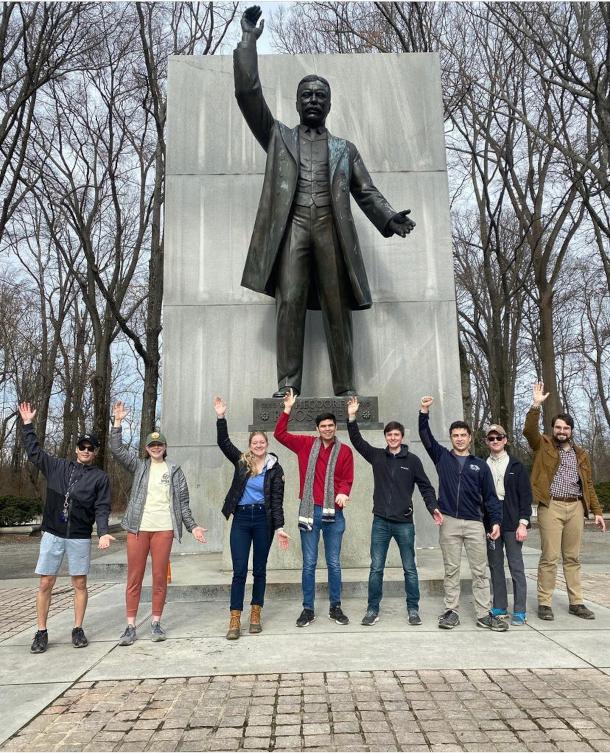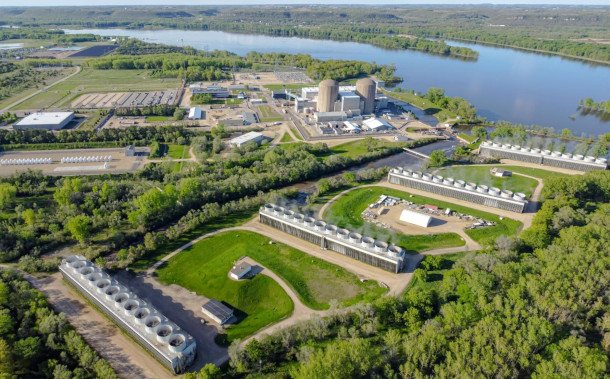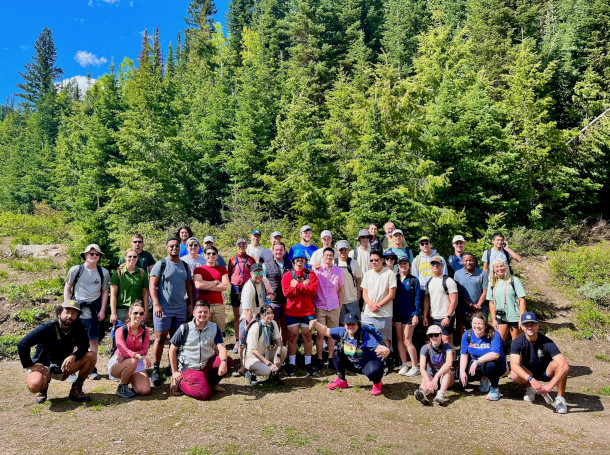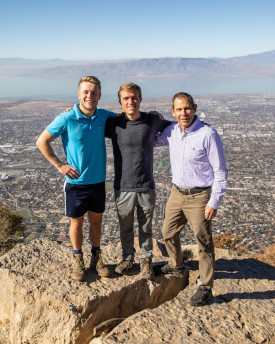Young Conservative Climate Voters
Air Date: Week of August 23, 2024

Members of American Conservation Coalition Action at Theodore Roosevelt Island, a national memorial located on the Potomac River in Washington, D.C. Theodore Roosevelt is often considered the "conservationist president". He studied natural history, enjoyed botany and believed nature existed to benefit mankind. (Photo: American Conservation Coalition Action)
Climate change has been a polarizing issue between Republicans and Democrats but there is a growing young conservative movement that's calling for action. American Conservation Coalition Action calls for increasing nuclear power, streamlining energy permitting processes, and prioritizing U.S. energy dominance. Chris Barnard, President of American Conservation Coalition Action, joined hosts Aynsley O’Neill and Steve Curwood to discuss ACC Action’s platform.
Transcript
CURWOOD: It’s Living on Earth, I’m Steve Curwood.
O’NEILL: And I’m Aynsley O’Neill.
So, Steve, we’ve mentioned that there are anti-environment Republicans who are using Kamala Harris’ environmental record and her campaign’s environmental plans against her. But there are also some pro-environment Republicans who are coming at the issue from a different angle.
CURWOOD: Of course, Aynsley, I mean, there’s a long history of Republican action on the environment, think Teddy Roosevelt. And while these issues have become polarized in recent decades, there’s nothing stopping conservative Americans from leading on climate or the environment.
O’NEILL: Exactly, and that’s the whole mission of the group American Conservation Coalition Action - bridge the perceived gap between Republican values and environmental action. I spoke with their president, Chris Barnard about exactly that ethos:
BARNARD: I think it’s really going back to first principles, like, if you think of the term conservative, you think of the term conservation, they’re really the same root word. It’s about wanting to protect and take care of the beautiful things around you, and then passing that on to future generations in a place better than when you found it. That’s the concept of stewardship, it’s the concept of personal responsibility, of taking care of your community, and thinking of future generations and past generations. I think honestly there’s nothing more conservative than conservation. It’s two sides of the same coin.
CURWOODL Words are one thing, what about actions? Where do they stand?
O’NEILL: I’m not going to lie, Steve, some of our listeners should get ready to clutch their sustainably-farmed pearls, because some of ACC Action’s positions are going to be a little controversial for many in the environmental movement. For example, they’re really supportive of nuclear as a clean energy source.
BARNARD: When it comes to climate specifically, I think one of the big issues that we're facing right now is, how can we have a growing economy, and how can we meet the increasing demand for electricity in a way that does not make climate change much worse. Our view at ACC action is that we need to have a lot more nuclear energy as part of that, because nuclear is, right now, the largest source of clean energy in the country that's also base load. But also we need to make it much easier in general, to just build energy infrastructure, whether it's transmission lines, whether it's battery storage facilities, whether it's solar farms or wind farms, or even pipelines for carbon being transported, for carbon capture and storage. I think right no, we don't have enough clean energy in the country and because of our regulatory system it's incredibly difficult to build nuclear energy projects. I think the reality is that we need to build more and we need to build faster and really it’s the government standing in the way of that.
O’NEILL: And as you can hear, ACC Action is also making a big push for overall permit reform - even if that includes fast-tracking fossil fuel projects as well as clean energy projects

The Prairie Island Nuclear Generating Plant (pictured above) is an electricity-generating facility located in Minnesota, along the Mississippi River, next to the Prairie Island Indian Community reservation. American Conservation Coalition Action believes that nuclear energy should be a key part of the United States clean energy landscape. (Photo: Wikideas, Wikimedia Commons, CC0 1.0 Universal)
BARNARD: And so I think it's really important that both sides come together and say, Okay, everyone wants to build more energy. Some people want more, like pipelines and things like that some people want more clean energy. If we pass a permitting reform package that will overwhelmingly benefit clean energy, and that is the only way that we can build this stuff at a scale and a speed enough to compete with climate change, but also to compete with China and make sure that we dominate these supply chains going forward. Even with the IRA right now, which is the largest investment in US history, and clean energy, a lot of that money will go to waste if we can't actually build the projects that that money is intended to go to.
CURWOOD: So Aynsley, what’s this claim based on?
O’NEILL: Well, Chris Barnard cites this study out of Princeton’s ZERO Lab. It suggests that 80% of the Inflation Reduction Act’s potential emissions reductions could go to waste unless we double the rate of electricity transmission expansion that we had in the last decade. And ACC Action believes that permitting reform is the best way to speed that expansion up.
CURWOOD: Well, permitting only exists as it does now because it’s based on legacy fossil fuel utilities. And switching our grids will be a lot more tricky than simply cutting some regulations, especially when you take into account things like Texas running on its own separate grid. But what else did he have to say about the Inflation Reduction Act?
O’NEILL: Chris thinks it was a missed opportunity for Democrats to reach across the aisle:
BARNARD: I think this has been said many times before, so at the risk of flogging a dead horse here, the IRA was a purely partisan package. It kind of was designed that way, and actually excluded a lot of Republican voices that could have probably contributed to making it a stronger deal. And so I think we to be clear in saying that that's not how I believe we should be creating laws, especially things that are as consequential as on climate and clean energy.
CURWOOD: But, Aynsley, I think a lot of Republican districts have benefitted from the massive spending under the IRA, right?

Members of the American Conservation Coalition Action during their 2023 Summit Hike. (Photo: American Conservation Coalition Action)
O’NEILL: Yeah, he did acknowledge that. It’s a bit ironic, in the end.
CURWOOD: But looking forward, the Democrats have now nominated Vice President Kamala Harris. What does this conservative conservation coalition group say about her environmental record?
O’NEILL: Well Chris said that for him, a red flag for Kamala is her co-sponsorship of the Green New Deal back in 2020, along with her past objection to fracking, something she has sort of walked back during this campaign:
BARNARD: Kamala Harris came out in the past. She's kind of flip flopped on this recently, but she said that she was opposed to fracking and would want to get rid of fracking in the United States. And again, I understand why someone who cares about climate would have that approach and would want to kind of get rid of like fossil fuel fracking. But again, it's one of those things where it's rooted in emotion and kind of ideology rather than rooted in reality. And you see that very clearly with the fact that the reason America has reduced emissions more than any other country in the world, more than the next eight countries combined, in the last 10 to 15 years, is because we've gone from coal to natural gas due to the fracking revolution.
CURWOOD: And of course, the only reason the U.S. has reduced emissions so greatly is because we had so many in the first place. When it comes to percentage of total national emissions, plenty of other countries have us beat. But what does he mean about our emissions reductions coming from a switch to natural gas?
O’NEILL: Now this is something that Chris told me - when natural gas is burned, it emits about half of the CO2 that coal does when it is burned.
CURWOOD: But that must not account for when natural gas, which is mainly methane, leaks into the atmosphere. So in that case, it’s much more potent than CO2 as a greenhouse gas.
O’NEILLL: Very true.
CURWOOD: So, there’s a lot of tension over natural gas. And on that and perhaps other measures, it seems like he and ACC Action are pushing for Kamala to take a more center position when it comes to energy.
O’NEILL: Yeah, Chris and definitely made a point to me that he thinks democrats and republicans need to find common ground on these issues.
BARNARD: So I really do think there are areas of bipartisan collaboration that don't necessarily make it through the rhetoric and all the things that we see in terms of the division, but there are things that we should be hopeful about. And really, at the end of the day, it's about, how can we make progress and not have perfection be the enemy of progress?
CURWOOD: Ah, so he seems to think realistic climate progress is going to require some trade-offs. And let’s face it, one of those might be burying the hatchet in terms of today’s deep partisan divide.
O’NEILL: Well, that’s for sure. And in the end, ACC Action wants to tell young conservative environmentalists that they have a place in politics - and older conservatives generally that they need to get on board:

Chis Barnard (left), Benji Backer (center) and Representative John Curtis (R-UT3, right) hike in Utah during ACC’s Electric Election Roadtrip. (Photo: American Conservation Coalition Action)
BARNARD: Well, look, if you're under 35 it doesn't matter if you're a Republican or a Democrat, a liberal or conservative, you care about climate change, you care about environmental issues, and it really matters a lot to who you are, how you view the world, and to how you felt. There was a poll recently that found that 81% of young Republicans under the age of 35 believed in climate change, thought it was a big issue and wanted to do something about it. So clearly, the overwhelming majority. And I think that's really what this is about. Young people care about this. They are demanding some kind of action. They are increasingly voting on this. It routinely ranks as a top three issue in how they vote, and that trend is going to dictate elections. It's going to dictate politics. It's going to dictate political affiliation for young people. And our message at ACC action to older Republicans is, look, this matters a lot to our generation, and if you want to make sure that you stay politically relevant to an entire generation of young people, you need to start talking about it productively and take a seat at the table.
O’NEILLL: That’s Chris Barnard, president of American Conservation Coalition Action.
CURWOOD: And Aynsley, he’s got it right that everyone is going to need to pitch in if we’re going to be able to survive the climate emergency.
O’NEILL: Yep, this is one issue that doesn’t care what party you’re in.
Links
Learn more about the American Conservation Coalition Action
Forbes | “Why the U.S. Leads The World In Reducing Carbon Emissions”
Energy Institute | “Statistical Review of World Energy”
Learn more about Princeton’s Repeat Group study about Electricity Transmission and the IRA
CRES | “Republicans and Independents Support Action to Promote Clean Energy and Combat Climate”
Living on Earth wants to hear from you!
Living on Earth
62 Calef Highway, Suite 212
Lee, NH 03861
Telephone: 617-287-4121
E-mail: comments@loe.org
Newsletter [Click here]
Donate to Living on Earth!
Living on Earth is an independent media program and relies entirely on contributions from listeners and institutions supporting public service. Please donate now to preserve an independent environmental voice.
NewsletterLiving on Earth offers a weekly delivery of the show's rundown to your mailbox. Sign up for our newsletter today!
 Sailors For The Sea: Be the change you want to sea.
Sailors For The Sea: Be the change you want to sea.
 The Grantham Foundation for the Protection of the Environment: Committed to protecting and improving the health of the global environment.
The Grantham Foundation for the Protection of the Environment: Committed to protecting and improving the health of the global environment.
 Contribute to Living on Earth and receive, as our gift to you, an archival print of one of Mark Seth Lender's extraordinary wildlife photographs. Follow the link to see Mark's current collection of photographs.
Contribute to Living on Earth and receive, as our gift to you, an archival print of one of Mark Seth Lender's extraordinary wildlife photographs. Follow the link to see Mark's current collection of photographs.
 Buy a signed copy of Mark Seth Lender's book Smeagull the Seagull & support Living on Earth
Buy a signed copy of Mark Seth Lender's book Smeagull the Seagull & support Living on Earth

